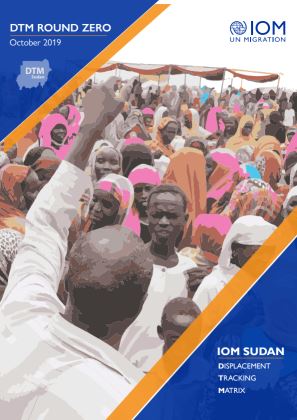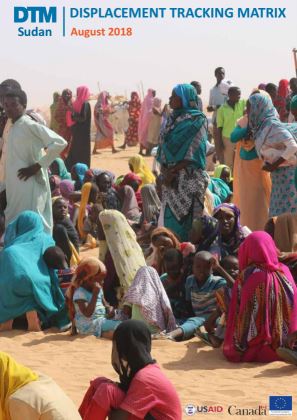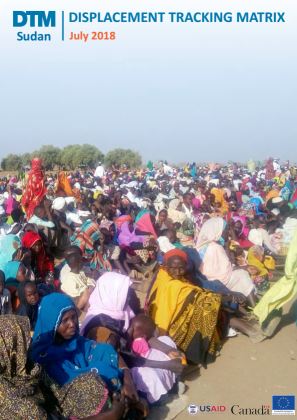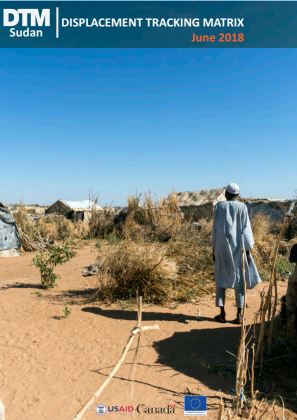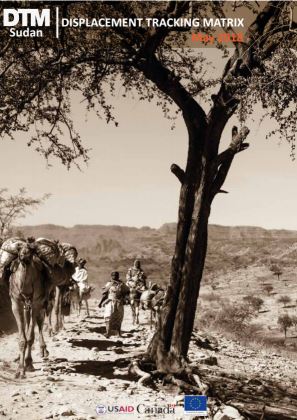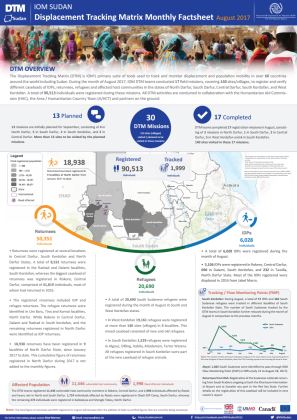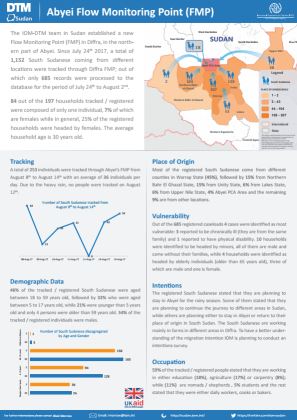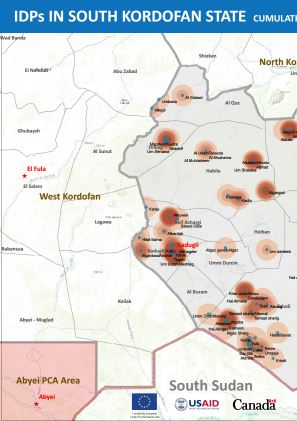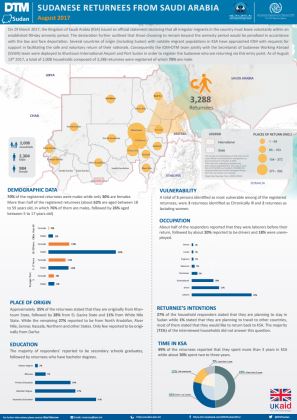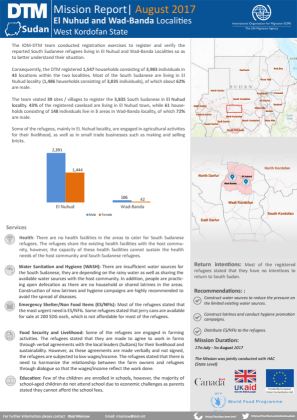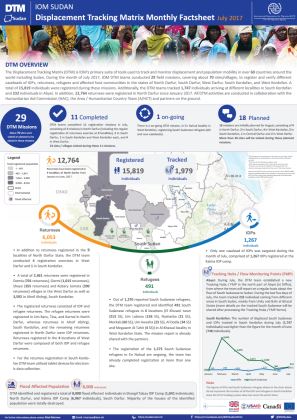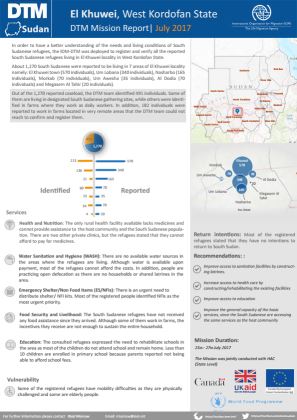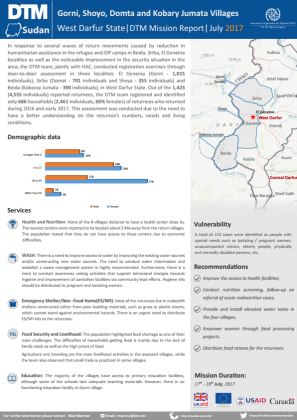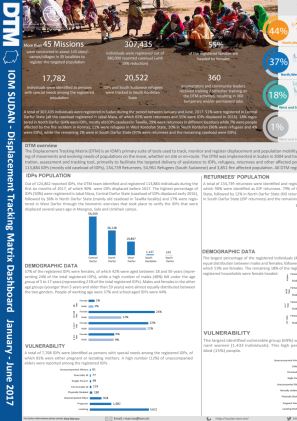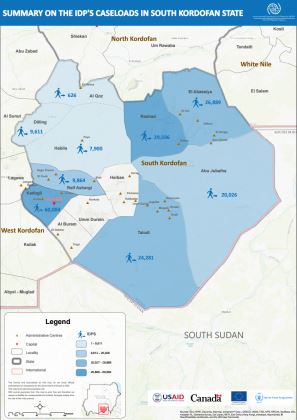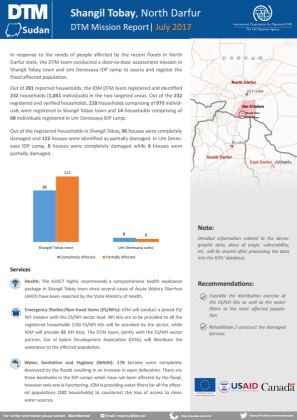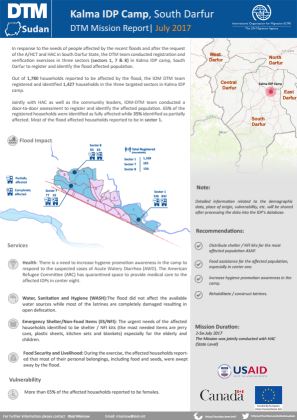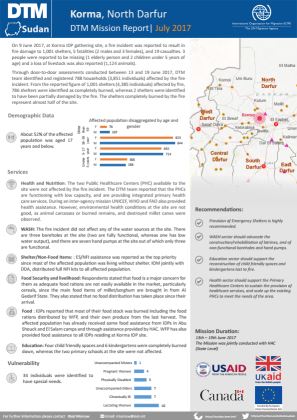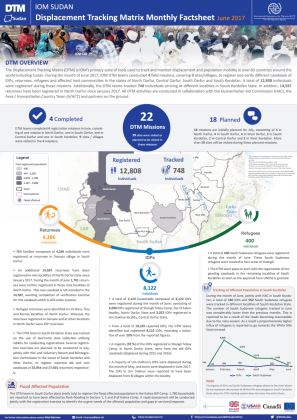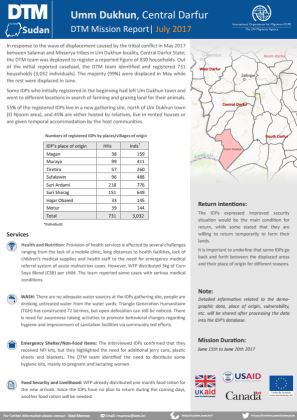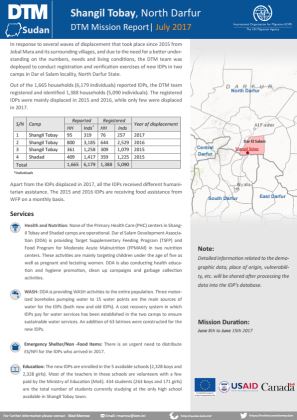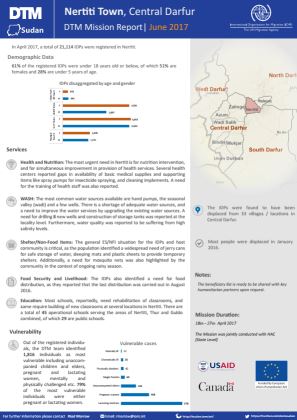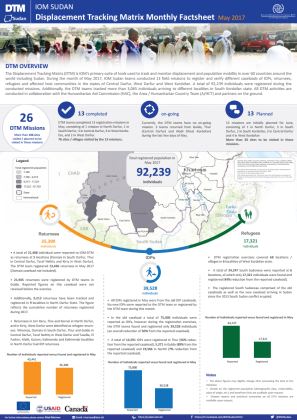-
Countries
-
Data and Analysis
-
Special Focus
-
Crisis Responses
Sudan
Suivi des PDI
Mouvements de déplacement
9,053,000
IDMC 2023
cycle de collecte de données
À propos Sudan
DTM is a system to track and monitor displacement and population mobility. It is designed to regularly and systematically capture, process and disseminate information to provide a better understanding of the movements and evolving needs of displaced populations, whether on site or en route. Data collection strategies and tools are based on the DTM global methodology but have been adapted to reflect the context and population movements specific to Sudan.
In order to appraise the humanitarian community with primary data on displacement caseloads and dynamics, DTM currently employs over 300 field enumerators to engage with its wide key informant network spanning all of Sudan’s 18 states. Enumerators are employed based on their prior knowledge of their areas of concern, and are trained on DTM Sudan’s global data collection standard and methodologies. To stay up-to-date with DTM’s outputs, please join our mailing list here.
Since 2004, DTM Sudan has provided rapid emergency registrations with a priority of meeting immediate information needs for guiding direct assistance to vulnerable people. In 2010, DTM expanded to include biometric registrations and data verifications – implemented in response to government or humanitarian partner requests. Registration data is mission critical for site managers to undertake beneficiary selection, vulnerability targeting, and to inform broader humanitarian programming. Additionally, DTM Sudan is has operated one Flow Monitoring Point at Abyei – registering the arrival of South Sudanese into the country.
Commencing in November 2019, DTM Sudan expanded its operations to implement Mobility Tracking (MT) across an initial seven states – expanding to reach a total of 17 states (as of Round Six). The MT methodology utilises key informant networks to systematically track mobility in locations of interest over consistent data collection rounds. Enumerators revisit each location and interview key informants to update locations and periodically verify population presence. DTM Sudan’s MT figures have been endorsed by the Humanitarian Aid Commission (HAC) and coordinated with UNOCHA, and is used to inform the Humanitarian Needs Overview (HNO) and Humanitarian Response Plan.
As a subcomponent of Mobility Tracking, Emergency Event Tracking (EET) is regularly deployed to track sudden displacements and population movements and provide more frequent updates when needed. EET is activated within 72 hours – one week after an event (such as natural disasters or conflict) to assist in rapid response planning. Prior to the implementation of EET, Early Warning Flash Alerts are disseminated within the first 24-48 hours of incidents to notify partners on sudden events where EET activities will subsequently take place. Additionally, DTM Sudan has designed Situation Assessments to collect data on populations in non-emergency settings or protracted situations caused by conflict or natural disaster.
Alongside the Mobility Tracking methodology, DTM has conducted Integrated Location Assessments (ILA). ILAs are utilised to enhance and provide accurate and up-to-date information on access to services at major sites of displacement, alongside profiles of displaced and returnee populations. The purpose of these exercises is to determine a severity level of living conditions of returnees and IDPs to allow partners to better strategize for resources and operations in vulnerable areas or to mitigate risks of push/pull factors for a more specific set of coherent interventions that bridge humanitarian, recovery, and stabilisation needs.
DTM has also supported data collection on the Multi-Sector Needs Assessment (MSNA). The MSNA aims to assess and provide timely update on sectoral humanitarian needs of populations across Sudan. In previous years, the MSNA provided an overview of the sectoral needs of IDP and non-displaced populations to inform humanitarian response and strategic programming. The MSNA is also the central component of providing a sound evidence base for the Humanitarian Needs Overview and Humanitarian Response Plan. The MSNA is completed in close coordination with UNOCHA, the Inter-Sector Coordination Group, and the National Assessment Task Team. Since 2021, DTM Sudan has typically conducted the MSNA on an annual basis in coordination with partners in the humanitarian community.
Since the onset of the military conflict between the Sudanese Armed Forces (SAF) and the Rapid Support Forces (RSF) commencing 15 April 2023, DTM Sudan has provided the humanitarian community with comprehensive updates on displacement trends observed as a direct result of the fighting. Six months following the conflict, DTM Sudan has observed IDPs in 167 of Sudan’s 189 localities, across all 18 states. Commencing with Situation Reports, and then becoming Weekly Displacement Snapshots, these reports also provide information on mixed-cross border flows to neighbouring countries. In these reports, DTM utilises a key informant methodology to capture best estimates of IDP caseloads, shelter typologies, and movement intentions. This information is gathered via dual combination of remote and face-to-face interviews. The Monthly Displacement Overview – which includes a greater contextual analysis including sex and age disaggregation, priority needs, and access to services at IDP locations.
For further information, please contact IOM Sudan:
- Tel.: +249 157 554 600/1/2
- Email: dtmsudan@iom.int
Bailleurs de fonds
- USAID
- ECHO
Sudan — Round Zero Displacement Report (October 2019)
The DTM was first introduced in Sudan in 2004, to provide rapid emergency registrations with a priority of meeting immediate information needs for guiding direct assistance to vulnerable people.
Sudan — Monthly Report (August 2018)
A total of 250,663 beneficiaries registered/ verified/ tracked since the beginning of 2018, in which 185,393 (48,399 IDPs, 131,958 returnees and 5,582 affected population/ vulnerable population) were properly registered, while the remaining 64,724 individuals were tracked in different locations.
Oct 07 2018
Sudan — Monthly Report (August 2018)
Sudan — Monthly Report (July 2018)
A total of 194,891 beneficiaries registered/ verified/ tracked since the beginning of 2018, in which 134,330 (21,624 IDPs and 113,454 returnees) were properly registered, while the remining 60,561 individuals were tracked in different locations.
Aug 20 2018
Sudan — Monthly Report (July 2018)
Sudan — Monthly Report (June 2018)
A total of 180,175 beneficiaries registered/ verified/ tracked since the beginning of 2018, of which 129,162 (17,183 IDPs and 111,979
Jul 26 2018
Sudan — Monthly Report (June 2018)
Sudan — Monthly Report (May 2018)
A total of 166,598 beneficiaries registered / verified / tracked since the beginning of 2018, in which 123,246 (14,796 IDPs and 108,450 returnees) were properly registered, while the remaining 44,878 individuals were tracked in different locations.
Jun 26 2018
Sudan — Monthly Report (May 2018)
Sudan — Ethiopian and Somali Migrants in Transit: A Snapshot Report (April 2018)
This snapshot only focuses on Somali and Ethiopian migrants in transit, more precisely in Sudan. Different field locations for data collection activities were chosen and Sudan was selected as one of the transit countries.
Sudan — Monthly Factsheet (August 2017)
During the month of August 2017, IOM DTM teams conducted 17 field missions, covering 140 sites/villages, to register and verify different caseloads of IDPs, returnees, refugees and affected host communities in the states of North Darfur, South Darfur, Central Darfur, South Kordofan, and West Kord
Sep 15 2017
Sudan — Monthly Factsheet (August 2017)
Sudan — Abyei Flow Monitoring Report (August 2017)
This Flow Monitoring Point (FMP) was established in Diffra, in the northern part of Abyei.
Sudan — South Kordofan State IDP Map (July 2017)
A map inicating the location of IDP populations in South Kordofan State (July 2017).
Aug 23 2017
Sudan — South Kordofan State IDP Map (July 2017)
Sudan — Sudanese Returnees from Saudi Arabia (August 2017)
On 29 March 2017, the Kingdom of Saudi Arabia (KSA) issued an official statement declaring that all irregular migrants in the country must leave voluntarily within an established 90-day amnesty period.
Sudan — El Nuhud and Wad-Banda Mission Report (August 2017)
DTM registered 1,547 households consisting of 3,983 individuals in 43 locations within the two localities. Most of the South Sudanese are living in El Nuhud locality (1,486 households consisting of 3,835 individuals), of which about 62% are male.
Sudan — Monthly Factsheet (July 2017)
The Displacement Tracking Matrix (DTM) is IOM’s primary suite of tools used to track and monitor displacement and population mobility in over 60 countries around the world including Sudan.
Aug 06 2017
Sudan — Monthly Factsheet (July 2017)
Sudan — El Khuwei, West Kordofan State Mission Report (July 2017)
1,270 South Sudanese were reported to be living in 7 areas of El Khuwei locality namely: El Khuwei town (570 individuals), Um Lobana (340 individuals), Nasharbo (165individuals), Morkab (70 individuals), Um Awesha (35 individuals), Al Dodia (70 individuals) and Megasem Al Tahir (20 individuals).&
Sudan — Gorni, Shoyo, Domta and Kobary Jumata Villages, West Darfur State Mission Report (June 2017)
In response to several waves of return movements caused by reduction in humanitarian assistance in the refugee and IDP camps in Beida, Sirba, El Geneina localities as well as the noticeable improvement in the security situation in the area; the DTM team, jointly with HAC, conducted registration e
Sudan — Displacement Dashboard (January — June 2017)
A total of 307,435 individuals were registered in Sudan during the period between January and June, 2017. 51% were registered in Central Darfur State (all the caseload registered in Jabal Mara, of which 65% were returnees and 35% were IDPs displaced in 2016).
Sudan — Summary on The IDP Caseloads In South Kordofan State (July 2017)
This map contains cumulative IDP figures by state.
Sudan — Shangil Tobay Mission Report (Flood) (July 2017))
In response to the needs of people affected by the recent floods in North Darfur state, the DTM team conducted a door-to-door assessment mission in Shangil Tobay town and Um Deressaya IDP camp to assess and register the flood affected population.
Sudan — Kalma IDP Camp Mission Report (July 2017)
In response to the needs of people affected by the recent floods in South Darfur State, the DTM team conducted registration and verification exercises in Kalma IDP camp, South Darfur to register and identify the flood affected population.
Sudan — Korma Mission Report (July 2017)
On 9 June 2017, at Korma IDP gathering site, a fire incident was reported to result in fire damage to 1,001 shelters, 5 fatalities (2 males and 3 females), and 19 casualties.
Jul 09 2017
Sudan — Korma Mission Report (July 2017)
Sudan — Monthly Factsheet (June 2017)
During the month of June 2017, IOM DTM teams conducted 4 field missions, covering 9 sites/villages, to register and verify different caseloads of IDPs, returnees, refugees and affected host communities in the states of North Darfur, Central Darfur, South Darfur and South Kordofan.
Jul 04 2017
Sudan — Monthly Factsheet (June 2017)
Sudan — Umm Dukhun Mission Report (July 2017)
In response to the wave of displacement caused by the tribal conflict in May 2017 between Salamat and Misserya tribes in Um Dukhun locality, Central Darfur State; the DTM team was deployed to register a reported figure of 830 households.
Jul 03 2017
Sudan — Umm Dukhun Mission Report (July 2017)
Sudan — Shangil Tobay Mission Report (July 2017)
In response to several waves of displacement that took place since 2015 from Jebal Mara and its surrounding villages, and due to the need for a better understanding on the numbers, needs and living conditions, the DTM team was deployed to conduct registration and verification exercises of new IDP
Jul 03 2017
Sudan — Shangil Tobay Mission Report (July 2017)
Sudan — Nertiti Town Mission Report (June 2017)
In April 2017, a total of 21,114 IDPs were registered in Nertiti. 61% of the registered IDPs were under 18 years old or below, of which 51% are females and 28% are under 5 years of age. The IDPs were found to have been displaced from 33 villages / locations in Central Darfur. Most
Jul 03 2017
Sudan — Nertiti Town Mission Report (June 2017)
Sudan — Monthly Factsheet (May 2017)
The total registered population in May 2017 was 92,239. A total of 35,390 individuals were identified as returnees during the reporting period. 39,528 individuals were identified as IDPs and 17,321 were recorded as refugees.
Jun 21 2017
Sudan — Monthly Factsheet (May 2017)
Pagination
Pagination
- First page
- Previous page
- 1
- 2
- 3
- 4
- 5


